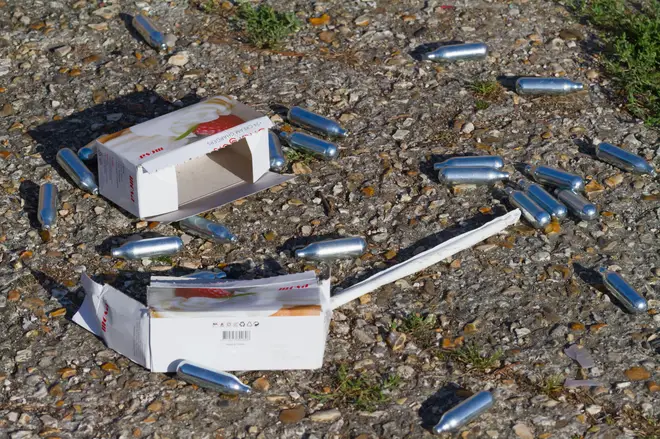
Iain Dale 7pm - 10pm
17 November 2023, 06:05

Two conservative police and crime commissioners (PCCs) have told LBC they think the policing of laughing gas should be as intense as the clampdown on heroin is.
Possession of nitrous oxide, where a person intends to inhale it, became illegal last week as it was designated as a class C drug.
But the enforcement of some substances has been slammed as “pathetically weak” by the PCCs for Dorset and Devon and Corwall, who have called for an end to “the obsession with a public health approach”.
David Sidwick, the PCC for Dorset told LBC: “There has been a lot of emphasis about the issues of heroin and cocaine but kids don’t go up to a drug dealer and say ‘give me some heroin’ as their first interaction.
“We do not talk enough about what I term illegal gateway drugs - prevention around cannabis, ketamine, MDMA and thank goodness, as the government has now said, about nitrous oxide.”
Read more: Climbing over war memorials 'not illegal but unfortunate', Met chief says
Alison Hernandez, the PCC for Devon and Cornwall also told LBC: “We’ve noticed how little enforcement there has been around class B and class C drugs and one thing we want to see change is the level of interest [from police] in those areas.
“We’ve noticed you can smell cannabis in the high streets and we’ve got streets with regular drug dealing. As a whole southwest team we wanted to see something different happening in our communities.”
She went on to tell a group of reporters: “There’s been too much conversation nationally about the legalisation of cannabis that a lot of people think it already is legal and we want to remind our communities that it’s not and the damage that it causes."
Campaigners have criticised the comments though, saying the war on drugs has already gone too far and isn’t yielding results.
Steve Rolles, senior policy analyst at the Transform Drug Policy Foundation, said: “Were we to start arresting everybody [who uses nitrous oxide] and criminalising them, that would be an obscene burden on an already stretched criminal justice system.
“There’s no evidence that would deliver anything positive. We’ve been enforcing our drug laws since 1971 now and during that period, we’ve seen the use of drugs increase.
“A criminal record can be a serious burden on a young person’s life chances - it’s a public health harm in and of itself.”
Announcing the ban on nitrous oxide last month, policing minister Chris Philp said: “We are delivering on the promise we made to take a zero-tolerance approach towards antisocial behaviour and flagrant drug taking in our public spaces.
“Abuse of nitrous oxide is also dangerous to people’s health and today we are sending a clear signal to young people that there are consequences for misusing drugs. Both users and dealers will face the full force of the law for their actions.”
The change to the law means possession of nitrous oxide, where a person intends to wrongfully inhale it, could lead to an unlimited fine, community service, a caution or a prison sentence for repeat serious offenders.